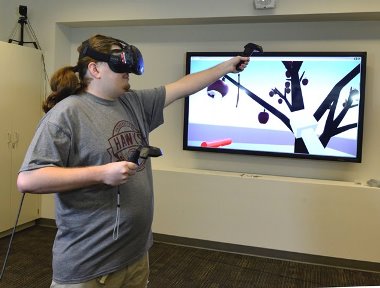
UMES engineering student a 3-D pioneer
Friday, May 12, 2017
Ben Whiteley has the distinction of being the first engineering graduate (Class of 2017) to leave the University of Maryland Eastern Shore with virtual reality programming skills, much of it self-taught.
His senior-year design project has established a new standard that he and faculty adviser Dr. Lei Zhang are hopeful will become a template of learning for future engineering majors to follow.
“I was looking to create a roadmap for new students coming in and have a working program to show them it can be done,” said Whiteley, who grew up in Ridgely, Md., a small town in northern Caroline County.
A self-professed video game enthusiast, Whiteley estimates he invested two years – sometimes working 30-plus hours a week – creating his own version from scratch.
“Game-based learning” as the newest method and practice in teaching “is booming now,” according to Zhang, an assistant professor in computer engineering.
Light-tight, wrap-around goggles with a special a screen are connected to hand-held controllers. Together, they are guided by sensors around the room – in this case, a computer lab, which enable a user to move about freely in a three-dimensional environment visible through the goggles.
Whiteley was guided by “memory matching” strategy. His version features such tasks as identifying different colored boxes, lifting or tossing them aside; grasping an appropriate implement to knock apples one-by-one from a tree; and aiming a virtual bow-and-arrow at designated targets to answer multiple choice quiz questions.
Whiteley sees virtual reality having practical applications as well. Simulating dangerous scenarios, for example, can provide participants the training and experience dealing with emergencies such as putting out a fire.
“The idea … is to get lab safety into the minds of the students,” he told a TV journalist during a demonstration (2:20 mark) of an early version of his senior-year project. “Always wear (safety) goggles if required, closed toe shoes, what fire extinguishers to use … that sort of thing.”
By tapping students’ interests in video games, Zhang believes virtual reality instruction at the university level will become an increasingly more essential teaching tool.
“We are making games so the student can learn by playing them,” Zhang said.
Virtual reality, Zhang predicts, will play a key role in influencing an ever-expanding spectrum of real-life activities and uses, including medicine, manufacturing, national defense and public safety.
“This is the direction computer programming is going,” he said. “It’s the latest thing.”
Whiteley can pinpoint when computer programming became his career path.
Kevin Webster, a teacher at North Caroline High School, visited Whiteley’s elementary school to make a presentation about the computers that fifth-graders could expect to encounter in middle school, and Whiteley came away enthralled by the possibilities.
Anxious to scratch that computer itch, he remembers skipping school one day just to help his father upload a Windows 98 program on a home computer.
“Ben Whiteley was one of the most inquisitive students that I have taught,” Webster said. “He has a desire to know how everything works. His solutions to problems were always more advanced than his peers.”
“His ability to visualize a solution and create it were uncanny,” Webster said. “He has the potential to conquer whatever he chooses.
As Whiteley weighed his choice for college to study engineering, UMES became his choice because of its size, the resources it provides students and the potential “to know all my professors.”
Zhang credits Whiteley with having “a very strong motivation. We just provided him the resources and the environment.”
That environment included the latest technology in labs on the third-floor of UMES’ $101.2 million Engineering and Aviation Science Complex, which opened in January 2016.
Prior to that, Whiteley said he did “a lot (of programming work and experimentation) in my dorm room. So, yeah, it’s been great to be able to work in this new lab. I feel it’s been a plus.”
Zhang said Whiteley has “exceeded expectations” and “has a very bright future.”
Whiteley thinks homes someday will have a dedicated “empty room with just the two sensors on the side … that will be the virtual reality room and you can watch a virtual reality movie, learn something in virtual reality – and also just play games in there.”

